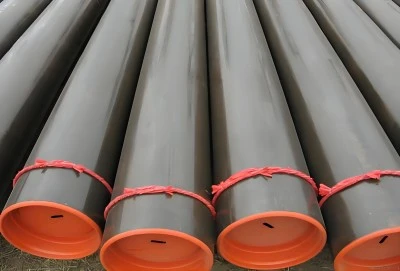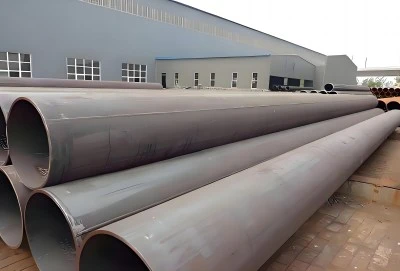In the world of oil and gas transportation, pipeline integrity and efficiency are paramount. API 5L X80 pipe has emerged as a crucial component in modern pipeline systems, offering superior strength and performance. This article delves into the specifications, chemical composition, mechanical properties, and grades of API 5L X80 pipe, providing valuable insights for industry professionals and enthusiasts alike.
|
|
|
What is the chemical composition of API 5L X80?
The chemical composition of API 5L X80 pipe is carefully engineered to achieve its high-strength properties while maintaining excellent weldability and toughness. The typical chemical composition includes:
- Carbon (C): 0.06-0.12%
- Manganese (Mn): 1.6-1.9%
- Silicon (Si): 0.15-0.45%
- Niobium (Nb): 0.03-0.06%
- Vanadium (V): 0.04-0.07%
- Titanium (Ti): 0.01-0.03%
- Molybdenum (Mo): 0.15-0.35%
The precise balance of these elements contributes to the pipe's exceptional mechanical properties. The low carbon content ensures good weldability, while the addition of microalloying elements like niobium, vanadium, and titanium helps achieve the desired strength through grain refinement and precipitation hardening.
It's worth noting that the exact chemical composition may vary slightly depending on the manufacturer and specific application requirements. However, all API 5L X80 pipes must meet the stringent chemical composition limits set forth in the API 5L specification to ensure consistent performance across different suppliers.
What are the mechanical property standards of API 5L X80?
API 5L X80 pipe is renowned for its exceptional mechanical properties, which make it suitable for high-pressure, long-distance pipeline applications. The key mechanical property standards include:
- Yield Strength: The minimum yield strength for API 5L X80 pipe is 555 MPa (80,500 psi), with a maximum of 705 MPa (102,300 psi). This high yield strength allows for thinner pipe walls, reducing material costs and weight while maintaining the necessary pressure resistance.
- Tensile Strength: The minimum ultimate tensile strength is 625 MPa (90,600 psi), with a maximum of 825 MPa (119,600 psi). This ensures the pipe can withstand the stresses encountered during installation and operation.
- Elongation: A minimum elongation of 18% in a 2-inch gauge length is required, demonstrating the pipe's ductility and ability to deform without failure.
- Toughness: API 5L X80 pipe must exhibit excellent low-temperature toughness. The Charpy V-notch impact energy at -20°C (-4°F) is typically specified to be at least 40 joules (30 ft-lbs) for full-size specimens, ensuring the pipe's resistance to brittle fracture in cold environments.
These mechanical properties are achieved through a combination of careful alloy design and controlled thermomechanical processing during manufacturing. The high strength-to-weight ratio of API 5L X80 pipe allows for increased transportation efficiency and reduced installation costs compared to lower-grade pipes.
It's important to note that these mechanical properties must be consistent not only in the pipe body but also in the heat-affected zones (HAZ) near welds. This consistency is crucial for ensuring the overall integrity and performance of the pipeline system.
What are the different grades of API 5L X80 pipe?
While API 5L X80 is itself a specific grade within the broader API 5L specification, there are variations and sub-grades within the X80 category that cater to different application requirements:
- Standard X80: This is the base grade that meets all the requirements specified in the API 5L standard for X80 pipe. It is suitable for most high-pressure pipeline applications and offers an excellent balance of strength, toughness, and weldability.
- X80Q: This is a quenched and tempered variant of X80 pipe. The "Q" designation indicates that the pipe has undergone additional heat treatment to enhance its mechanical properties, particularly its low-temperature toughness. X80Q pipes are often chosen for arctic or deep-water applications where extreme environmental conditions are encountered.
- X80M: The "M" suffix denotes a thermomechanically rolled pipe. This manufacturing process results in a fine-grained microstructure that contributes to improved strength and toughness without the need for additional heat treatment.
- X80H2S: This grade is specifically designed for sour service applications where hydrogen sulfide (H2S) is present. It offers enhanced resistance to hydrogen-induced cracking (HIC) and sulfide stress cracking (SSC), making it suitable for pipelines transporting sour crude oil or natural gas.
- X80PSL2: This designation indicates that the pipe meets the more stringent Product Specification Level 2 (PSL2) requirements of the API 5L standard. PSL2 pipes undergo additional testing and have tighter tolerances on chemical composition and mechanical properties compared to PSL1 pipes.
The choice between these grades depends on factors such as operating conditions, environmental challenges, and specific project requirements. For instance, an offshore pipeline in an arctic region might opt for X80Q for its superior low-temperature performance, while a pipeline transporting sour gas would benefit from the X80H2S grade.
It's worth noting that custom grades within the X80 category can also be developed in collaboration with manufacturers to meet unique project specifications. These custom grades might incorporate additional alloying elements or undergo specialized processing to achieve specific performance characteristics.
API 5L X80 Pipe Manufacturer
API 5L X80 pipe represents a significant advancement in pipeline technology, offering a combination of high strength, excellent toughness, and good weldability. Its carefully engineered chemical composition and stringent mechanical property standards make it an ideal choice for demanding oil and gas transportation projects, particularly in high-pressure and long-distance applications.
The various grades and sub-grades within the X80 category provide flexibility to meet diverse project requirements, from arctic environments to sour service conditions. As the energy industry continues to push the boundaries of pipeline technology, API 5L X80 pipe remains at the forefront, enabling more efficient and reliable transportation of oil and gas resources.
For those considering API 5L X80 pipe for their next pipeline project, it's crucial to work with experienced manufacturers who can provide guidance on selecting the most appropriate grade and ensure compliance with all relevant standards and specifications. By leveraging the advantages of API 5L X80 pipe, pipeline operators can enhance the safety, efficiency, and longevity of their transportation systems.
Ready to explore how API 5L X80 pipe can revolutionize your pipeline project? Contact the experts at Longma Group today. With our extensive experience in manufacturing high-quality ERW and LSAW steel pipes, including API 5L X80 grades, we're here to help you find the perfect solution for your needs. Email us now at info@longma-group.com to start a conversation about your project requirements and discover the Longma Group difference.














